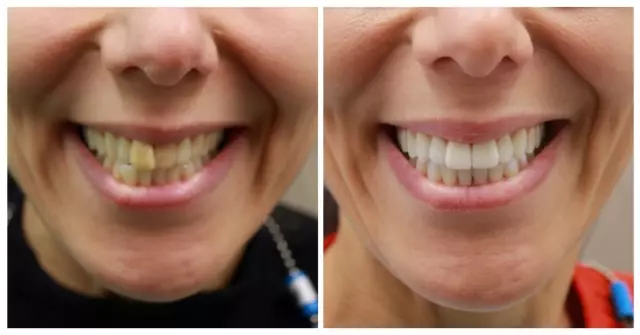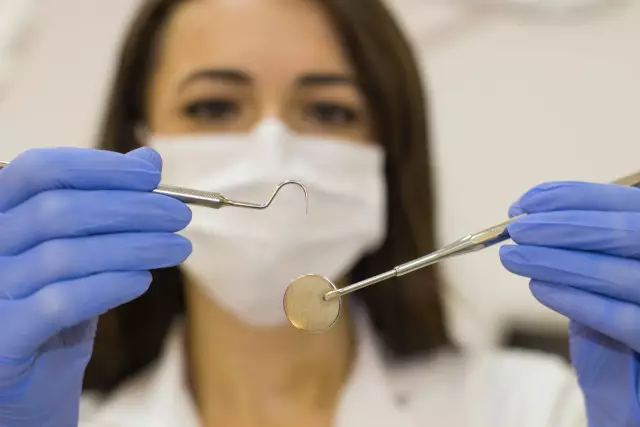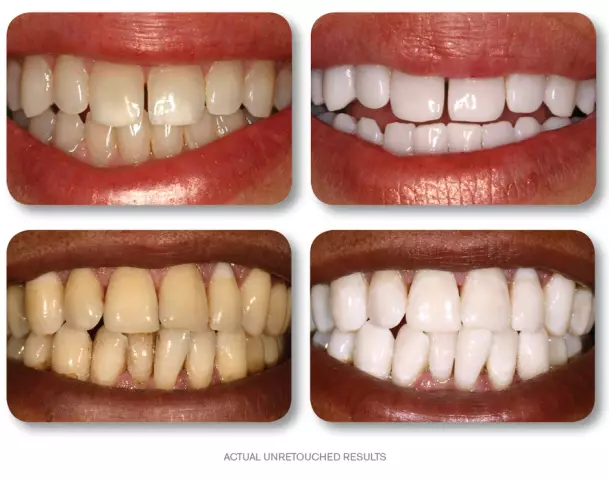- Author Rachel Wainwright wainwright@abchealthonline.com.
- Public 2023-12-15 07:39.
- Last modified 2025-11-02 20:14.
Teeth whitening

Strong, white and beautiful teeth have always been considered the standard of beauty and youth, but until recently, snow-white beautiful smiles, so characteristic of famous film actors, were considered almost unattainable for the common population of the planet. But science does not stand still, therefore modern dentistry today has a rather impressive arsenal of tools for teeth whitening.
Causes of teeth discoloration
Teeth whitening, according to reviews, is not only an aesthetic procedure. In some cases, it can become absolutely necessary for a person when the teeth darken or acquire an ugly yellowish tint.
Teeth discoloration can be divided into superficial and deep. Superficial discoloration occurs as a result of eating foods with pronounced coloring properties: tea, coffee, red wine, chocolate, mustard, tomatoes, Pepsi-Cola, blueberries, soy sauce, nicotine.
Deep staining of teeth occurs, as a rule, as a result of a person's use of chemicals or certain medications. For example, children often turn their teeth dark gray as a result of the use of tetracycline antibiotics by the mother during pregnancy or by children under the age of eight. Deep staining of teeth can be observed when eating water with a high content of fluoride and iron, as well as in a number of diseases of the body.
Teeth whitening methods
There are three main methods of teeth whitening:
- Professional teeth whitening using special devices. Such whitening is performed exclusively in the dental office.
- Professional teeth whitening with gels or special mouth guards. This kind of whitening can usually be used at home as well.
- Teeth whitening at home using special whitening pastes, chewing gums and other products that can be purchased without a doctor's prescription.
Professional teeth whitening
Undoubtedly, professional teeth whitening products are much more effective and safe, despite the fact that their cost is higher.
For most young people, as a rule, for teeth whitening it is enough to give up bad habits and use not too expensive publicly available means. Of course, with pronounced problems, you cannot do without professional help. Here are the most common professional teeth whitening methods:
- Teeth whitening with special compounds. The technology of such whitening consists in impregnating the teeth with special compounds that penetrate the pores and discolor organic impurities, releasing free radicals. The most common remedies are carbamide and hydrogen peroxide. According to reviews, teeth whitening using special formulations is quite effective. Several in-room whitening sessions are usually sufficient. The action of some drugs is enhanced by stimulating the formation of free radicals. For this purpose, special lamps or ultraviolet irradiation are used.
- Laser teeth whitening. Such teeth whitening, according to reviews, is considered the softest and most traumatic. Moreover, the more modern the technique of laser whitening, the less ultraviolet heat or radiation is required to activate the whitening composition, and the effect is stronger and more stable. Actually, teeth whitening consists of several stages. At the first stage, the doctor diagnoses and searches for the causes of darkening of the teeth. After that, he chooses the optimal bleaching scheme, makes individual mouth guards (containers for gel used at home), selects drugs. After achieving the optimal effect, a special varnish is applied to the teeth to strengthen the teeth and make them shine.
- Teeth whitening with the ZOOM 3 system. This system consists in pre-treatment of teeth with potassium nitrate and fluorine, after which hardware whitening occurs, which takes about 1.5 hours. After that, the doctor prescribes preparations for supportive home whitening, which consolidate the result obtained and have a mild effect due to the presence of amorphous calcium compounds in them.
It is important to be careful when choosing a clinic and a whitening specialist. According to reviews, teeth whitening with excessive ultraviolet radiation and gels is often fraught with burns to the oral cavity. A competent specialist should be able to choose a whitening scheme taking into account the individual characteristics of the patient's body, otherwise, the procedure may lead to increased sensitivity of the teeth and erasure of tooth enamel.
Teeth whitening methods at home

The most common folk remedy for teeth whitening is hydrogen peroxide. At the same time, no special preparation is required to whiten teeth at home using hydrogen peroxide. It is enough just to dissolve 20 g of peroxide in 50 ml of water and rinse your mouth with the solution for several minutes. After that, rinse your mouth thoroughly with water.
Recently, there are a wide range of special whitening gels based on hydrogen peroxide that can also be used at home.
Another well-known means of whitening teeth is the use of charcoal. In ancient times, wood ash was used for these purposes, simply applying it to the finger and cleaning the teeth with powder. Today, instead of ash, activated carbon can be successfully used. It must be crushed into powder, dipped in a toothbrush and brushed with charcoal. You can also add some charcoal directly to the toothpaste.
The undoubted hit of home teeth whitening is whitening with soda. Baking soda quickly and effectively removes stains and impurities from teeth, but it should not be abused, as it destroys tooth enamel and injures the gums. In general, this teeth whitening product is not recommended to be used more than once a week.
A fairly new and effective remedy, according to reviews, of teeth whitening is the use of tea tree oil. This method is especially popular because it does not spoil the tooth enamel and does not injure the gums at all.
Contraindications to teeth whitening
You cannot carry out the procedure during pregnancy and lactation, in children under 18 years of age, in the presence of various defects in tooth enamel. You should be aware that you may have an allergic reaction to various whitening preparations.
In addition, teeth whitening is prohibited in the presence of a large number of crowns and fillings, broken teeth and carious areas, and abundant dental deposits. It is forbidden to whiten teeth in the presence of severe general diseases (bronchial asthma, blood pressure, tumors, etc.).
Found a mistake in the text? Select it and press Ctrl + Enter.






